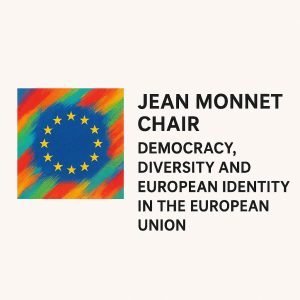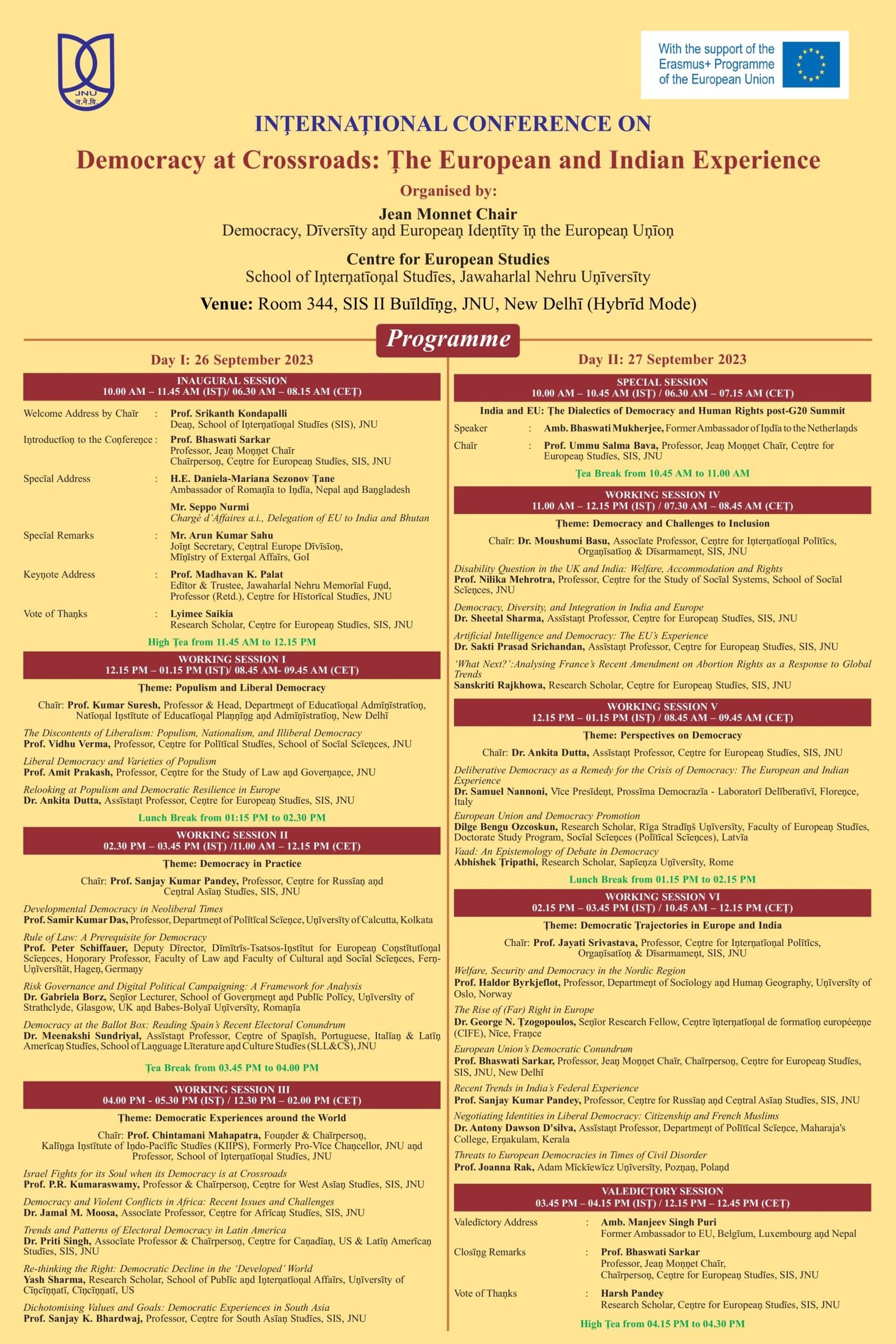
- This event has passed.
International Conference – “Democracy at Crossroads: The European and Indian Experience” 26 & 27 September 2023

![]()


Democracy at Crossroads: The European and Indian Experience
September 26 & 27, 2023
Organised by
Jean Monnet Chair on
‘Democracy, Diversity and European Identity in the European Union’
Centre for European Studies,
School of International Studies, Jawaharlal Nehru University
Concept Note
Democracy at Crossroads: The European and Indian Experience
Democracy has long established itself as a form of government that best allows citizens to realize their demands and address their concerns. Representation, accountability, transparency, rule of law, rights of all citizens, additionally minority rights are at the heart of what democratic system and governance is all about. Democracy was opted for by postcolonial states and also by post-communist states. However, the march of liberal democracy which appeared unstoppable at the end of the cold war when the Soviet bloc crumbled and stood ideologically defeated is today uncertain. Several surveys which measure democracy/democratic performance across the globe warn about the failing democratic health of the world. In this context it is important to focus on two large democratic spaces and societies – Europe and India to examine how these two spaces function as democracies, their institutional structures and mechanisms, the challenges they encounter and the responses they present to improve democratic content and quality.
Democracy and democratic functioning have been critically impacted with the advent and popularity of social media which has opened up space for connection but the connects appear as much if not more competitive and conflictual as they are constructive and accepting. Societies all across appear more and more polarized. Even developed democracies like the US showed signs of stress when in the last Presidential election not only was Trump unwilling to accept the election results but actually egged his supporters to attack the White House challenging the election.
In the EU there is growing refrain of democratic backsliding in many member states to the extent that EU and the member states are taking each other to court on questions of democracy and rights. Rights of Roma minority, immigrant groups, LGBTQ community figure prominently in democracy discourse and the question of democracy nowhere appears to be settled. From liberal to illiberal democracy the discourse on democracy has come a long way. As European societies have become more and more diverse, questions about freedom of expression, importance of lead culture of host society have entered the democracy debate. Rightwing populist parties with a core narrative of ‘othering’ have emerged as relevant political actors as they connected with citizen sections that found themselves on the wrong side of globalization. These parties today have increasing presence and acceptance in Europe and are influencing the democratic space in critical ways.
Apart from these developments the economic performance and growth of China sans democracy has decoupled liberal democracy as a necessary condition for economic growth. This has not only implications for developments internal to China but also the role it readies to play in global affairs. In international relations and foreign policy documents emanating from the West there is a continuous refrain and stress on rules based international order which democratic states should come together to uphold and defend. This opens wide the question what these developments in Europe, in member states and beyond mean for EU as a normative actor at the heart of which lies democracy as a political system, a way of life.
India a young democracy at 75 has seen its democracy ratings plummet with agencies going to the extent of characterizing it as “electoral autocracy”. The Indian government has of course been quick to counter negative assessments stressing on linking democracy not as a post-colonial choice but rooted in India’s civilizational identity. In international relations India is placed firmly in the democratic camp. EU for instance talks of India-EU as natural partners, in all summits, meetings and policy documents India and Europe’s democratic character is stressed.
However, there is no denying that democracy both in Europe and India is experiencing strains, pulls, and pressures that do not have easy answers. In the light of this we at the Centre for European Studies under the Jean Monnet Chair on “Democracy, Diversity and European Identity in the European Union”, are organizing a two-day international conference on 21 and 22 September 2023 to deliberate on how democratic systems are functioning, how can democracies cope with challenges of diversity, social media, mobility, polarization, terrorism without losing essence and continue to provide opportunity and space for meaningful representation and participation of all sections to advance and ensure equity and justice.
Paper presentation on Europe and India is invited on themes noted below but not limited to it.
- Re-examining democracy – liberal/ illiberal
- Democracy and globalization
- Impact of social media on democracy
- Impact of terrorism
- Populism and democracy
- Democracy and the question of rights
- European Union and democracy promotion
Papers will be selected on the basis of abstracts (a maximum of 250 words with up to six keywords) to be submitted by 31 May, 2023, to ceusconference2021@gmail.com. The decision regarding the acceptance of proposed papers will be communicated by 10 June, 2023. Accepted full paper to be submitted by 30August, 2023. For any queries, please reach out to the Organising Team at ceusconference2021@gmail.com. or bhaswatices@gmail.com.
Bhaswati Sarkar
Conference Co-ordinator
Professor
CES/SIS/JNU
Event Report
The two-day International Conference on the theme “Democracy at Crossroads: The European and Indian Experience” was held on 26 and 27 September 2023. The conference aimed to deliberate on how democratic systems are functioning, how can democracies cope with challenges of diversity, social media, mobility, polarization, terrorism without losing essence and continue to provide opportunity and space for meaningful representation and participation of all sections to advance and ensure equity and justice.
The conference began with the welcome address by the Dean of the School of International Studies (SIS), Prof. Srikanth Kondapalli. After that, Prof. Bhaswati Sarkar introduced the conference theme to the esteemed guests and the rest of the audience. The inaugural session was also addressed by H.E. Dainela-Mariana Sezonov Tane, the Ambassador of Romania to India, Bangladesh and Nepal, who delivered a special address. A special address was also delivered by Mr. Seppo Nurmi, Charge d Affaires of the Delegation of the European Union (EU) to India and Bhutan. Mr. Arun Kumar Sahu, Joint Secretary, Central Europe Division in the Ministry of External Affairs in the Government of India also gave special remarks after which Prof. Madhavan K. Palat, former faculty at the Centre for Historical Studies, JNU delivered the keynote address of the conference. The inaugural session concluded with the vote of thanks delivered by Lyimee Saikia, a research scholar at the Centre for European Studies, SIS, JNU.
The Working Sessions of the conference followed the high tea which took place after the conclusion of the inaugural session. Working Session I titled ‘Populism and Liberal Democracy’ which was chaired by Prof. Kumar Suresh, Head, Department of Educational Administration, National Institute of Educational Planning and Administration, New Delhi, looked at themes like populism, liberalism and illiberalism. Discussions centred on topics like the discontents of liberalism, varieties of populism and populism and democratic resilience in Europe.
Working Session II of the conference titled ‘Democracy in Practice’ was chaired by Prof. Sanjay Kumar Pandey, Professor, Centre for Russian and Central Asian Studies, SIS, JNU. It looked at democracy in contemporary times. Discussions involved topics like developmental democracy in neoliberal times and rule of law as a prerequisite for democracy. Presentations also detailed on digital political campaigning and recent Spanish elections.
Working Session III of the conference titled ‘Democratic Experiences around the World’ was chaired by Prof. Chintamani Mahapatra, Founder & Chairperson, Kalinga Institute of Indo-Pacific Studies (KIIPS) and former pro-Vice Chancellor and Professor at JNU. It looked at the state of democracy in different regions of the world. Discussions centred around Israeli democracy, democracy and violence in Africa, electoral democracy in Latin America, democratic decline in the developed world and the democratic experiences in South Asia.
Day 2 of the conference began with special session titled ‘India and EU: The Dialectics of Democracy and Human Rights post-G20 summit’ chaired by Prof. Ummu Salma Bava of the Centre for European Studies, SIS, JNU. The speaker for this session was Ambassador Bhaswati Mukherjee, former Indian Ambassador to the Netherlands.
Working Session IV followed the special session. Titled ‘Democracy and Challenges to Inclusion’, it was chaired by Dr. Moushumi Basu, Associate Professor, Centre for International Politics, Organisation & Disarmament (CIPOD), SIS, JNU and looked at the interaction of democracy and inclusion and challenges therein in contemporary times. Presentations centred on topics like the disability question in UK and India with special focus on welfare, accommodation and rights. Other topics discussed were the interaction of democracy with diversity and integration in Europe as well as India, Artificial Intelligence and democracy and the debate of French abortion rights.
Working Session V of the conference was titled ‘Perspectives on Democracy’ and was chaired by Dr. Ankita Dutta, Assistant Professor, Centre for European Studies, SIS, JNU. It focused on topics like deliberative democracy, democracy promotion and on epistemology of debate in democracy.
Working Session VI of the conference was the last working session of the conference and was titled ‘Democratic Trajectories in Europe and India’. It was chaired by Prof. Jayati Srivastava, Professor, CIPOD, SIS, JNU. It looked at how the trajectory of democracy is evolving in Europe and India in recent times. Presentations centred around topics like welfare, security and democracy in the Nordics, rise of the far-right in Europe, EU’s democratic conundrum, recent trends in India’s federal experience and liberal democracy and French Muslims.
The working sessions concluded with the Valedictory Session which marked the successful ending of the conference. The Valedictory Session started with the valedictory address by Ambassador Manjeev Singh Puri, former Indian Ambassador to the EU, Belgium, Luxembourg and the Netherlands, giving his views on the present state of democracy in Europe and India. It was followed by closing remarks by Prof. Sarkar who reflected on the proceedings of the conference and highlighted important topics which came up for discussion during the two days. The session concluded with a vote of thanks by Harsh Pandey, research scholar at the Centre for European Studies, SIS, JNU in which he thanked all the guests, participants and the volunteers for making the conference an overwhelming success.
